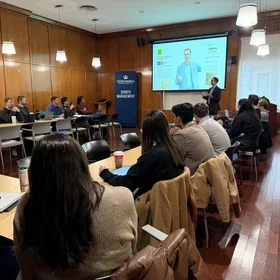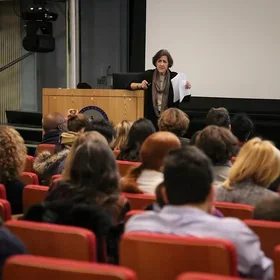By Aimee Vichiennet, Student in M.S. in Information & Knowledge Strategy (IKNS)
My personal and professional journey has always revolved around my experiences in the realm of language, cultural studies, and the performing arts. Recently, this journey sparked a fundamental question in my mind: Can we leverage art-based processes to foster greater collaboration and innovation?
Over the years, I've witnessed the transformative power of art firsthand in both my academic and professional pursuits. For instance, I’ve seen how introducing improv comedy concepts such as “Yes, and” into corporate settings can be transformative. This mentality, centered on embracing and building upon ideas collaboratively, not only sparks creativity but is a good opportunity for team members to practice active listening, open-mindedness, and collective innovation, with the goal of creating a more connected, creatively engaged work environment.
The skills I've cultivated through my active participation in the arts—which include creativity, resilience, perspective-taking, and teamwork—have enriched my life, allowing me to approach challenges in my professional roles in people operations and strategic planning from a unique perspective.
During a recent summer, I completed my IKNS independent study course, an elective that offers students the freedom to explore a subject of personal interest that falls within the program's three core areas: data, people, and strategy. This elective allows for a more personalized and specialized exploration, which reflects the flexibility of the IKNS program to accommodate diverse interests and career trajectories. Although I initially did not anticipate a specific interest in this elective, my perspective shifted after completing the first semester after discovering a topic that resonated deeply with my passion: the intersection of art and innovation networks.
My research was on the ability of art-based practices (ABPs) to enhance collaboration within open innovation networks, which are knowledge networks that involve the cooperation of contributors within an ecosystem that crosses organizational or divisional boundaries. In this work, which involved interviews, observation, and literature synthesis, I discovered some possible links between ABPs and growth in middle-income countries:
- Art-based practices are associated with inclusive neurological processes and can lead to long-term neuroplasticity.
- Open innovation, which has been championed by middle-income countries as essential to growth, frequently devolves into a transactional mindset rather than a network mindset.
- Since a network mindset calls for suspending the hierarchical notions of output and process, networks (especially open innovation networks, which have genuine impacts on global development) would be wise to adopt some form of ABPs to achieve their innovation goals.
I initially chose the IKNS graduate program at Columbia because I was attracted to the interdisciplinary approach embedded in the three core curriculum areas. I was searching for a well-rounded program that could help me transition from a career in HR to organizational strategy in the tech industry. My curiosity lay in understanding how technology and data could be leveraged by organizations to enhance the most important aspect of any organization: its people. That's when I came across IKNS, which was perfect for my needs.
The idea of tailoring my studies to enhance both my skills and intellectual curiosity through a selection of Columbia-wide elective classes excited me, and the program's smaller size appealed to me because I wanted to cultivate more genuine connections with my peers. I reached out to alumni to gain insights into the program and learned that the IKNS program’s values, particularly its focus on authentic and inclusive leadership, resonated with my leadership principles and aligned with my career growth aspirations.
Along the way, I have had the privilege of collaborating closely with faculty members such as Professor Katrina (Kate) Pugh, who convenes networks and teaches a course at Columbia’s School of Professional Studies on network science. Dr. Pugh and the Information & Knowledge Strategy (IKNS) program also introduced me to frequent IKNS speaker T.J. Elliott, former chief knowledge officer for the global standardized test assessment organization Educational Testing Service (ETS), and this collaboration broadened my horizons and opened doors to new research opportunities.
I have been impressed with how disarming and generous my instructors have been in openly sharing their networks and experiences. The faculty within the IKNS program empower students to delve into their chosen areas of interest and help students draw from their extensive wealth of experience. This integration of professional and academic research has fostered a profound understanding of my field, offering the best of both worlds in my pursuit of knowledge.
My experience at Columbia’s School of Professional Studies has not only advanced my research endeavors, but also directly impacted my professional career, and has enhanced my capabilities as an innovative and creative strategist.
Views and opinions expressed here are those of the authors, and do not necessarily reflect the official position of Columbia School of Professional Studies or Columbia University.
About the Program
The Columbia University M.S. in Information & Knowledge Strategy (IKNS) program provides students with foundations in information science, organizational psychology, and change management as well as practical skills in project management and executive leadership.
Students train under world-class faculty, including former and current executives from Google, IBM, NASA, and Oliver Wyman, and join a powerful, global alum network in coveted positions, including at Accenture, Alphabet, Harvard Business Publishing, Nike, Pfizer, and the World Bank.
Fall 2024 application deadlines for IKNS are March 15 for applicants with international documents and June 1 for the final deadline. Applications are reviewed and admission decisions released on a rolling basis. Learn more here.



